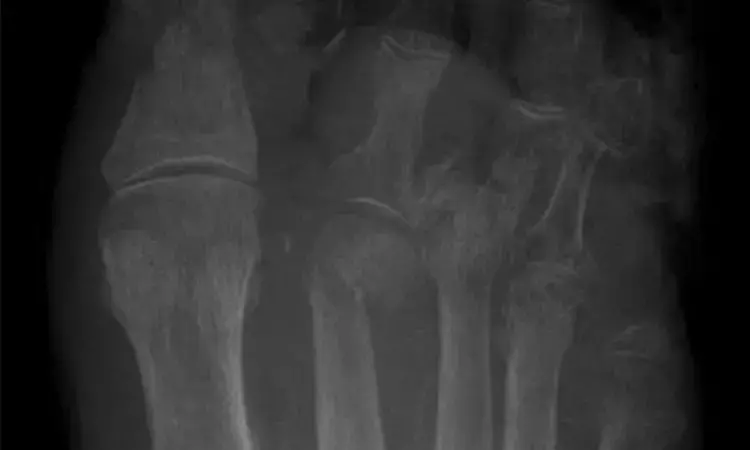- Home
- Medical news & Guidelines
- Anesthesiology
- Cardiology and CTVS
- Critical Care
- Dentistry
- Dermatology
- Diabetes and Endocrinology
- ENT
- Gastroenterology
- Medicine
- Nephrology
- Neurology
- Obstretics-Gynaecology
- Oncology
- Ophthalmology
- Orthopaedics
- Pediatrics-Neonatology
- Psychiatry
- Pulmonology
- Radiology
- Surgery
- Urology
- Laboratory Medicine
- Diet
- Nursing
- Paramedical
- Physiotherapy
- Health news
- Fact Check
- Bone Health Fact Check
- Brain Health Fact Check
- Cancer Related Fact Check
- Child Care Fact Check
- Dental and oral health fact check
- Diabetes and metabolic health fact check
- Diet and Nutrition Fact Check
- Eye and ENT Care Fact Check
- Fitness fact check
- Gut health fact check
- Heart health fact check
- Kidney health fact check
- Medical education fact check
- Men's health fact check
- Respiratory fact check
- Skin and hair care fact check
- Vaccine and Immunization fact check
- Women's health fact check
- AYUSH
- State News
- Andaman and Nicobar Islands
- Andhra Pradesh
- Arunachal Pradesh
- Assam
- Bihar
- Chandigarh
- Chattisgarh
- Dadra and Nagar Haveli
- Daman and Diu
- Delhi
- Goa
- Gujarat
- Haryana
- Himachal Pradesh
- Jammu & Kashmir
- Jharkhand
- Karnataka
- Kerala
- Ladakh
- Lakshadweep
- Madhya Pradesh
- Maharashtra
- Manipur
- Meghalaya
- Mizoram
- Nagaland
- Odisha
- Puducherry
- Punjab
- Rajasthan
- Sikkim
- Tamil Nadu
- Telangana
- Tripura
- Uttar Pradesh
- Uttrakhand
- West Bengal
- Medical Education
- Industry
Dalbavancin Promising in Diabetes-Related Foot Osteomyelitis

A recent study finds the potential of the antibiotic dalbavancin in managing diabetes-related foot osteomyelitis, a severe complication affecting patients with diabetes. The findings were published in journal of Infectious Diseases Now.
A total of thirteen patients were included from January 2019 to December 2021, a substantial 85% underwent surgical treatment, underlining the severity of the cases involved. Also, this research encompassed consecutive patients receiving at least one 1500 mg dose of dalbavancin. Dalbavancin was administered as the first-line treatment in 46% of the cases, while 54% received it as a second-line option, required by adverse events linked to prior treatments.
The study reported just one adverse event, highlighting the overall well-tolerated nature of dalbavancin. After a rigorous 6-month follow-up period from the last dalbavancin dose, the findings revealed that 82% of the evaluable patients achieved remission. Remission was defined as the absence of relapsing infection or the need for surgery at the initial or a contiguous site.
These promising results suggest that dalbavancin holds potential as an effective and safe treatment option for diabetes-related foot osteomyelitis, especially when considering its favorable tolerability and notable efficacy in both microbiological and clinical aspects.
Diabetes-related foot osteomyelitis poses a significant health risk to individuals with diabetes, often requiring intricate management strategies. The findings on dalbavancin provide good hope, offering a potential avenue for enhanced treatment outcomes. The efficacy of the antibiotics, coupled with its tolerability profile, positions it as a special candidate in the evolving landscape of diabetes-related complications. Further research and larger-scale trials are anticipated to solidify these preliminary findings, paving the way for more effective and targeted treatments in the realm of diabetic foot complications.
Reference:
Boucher, A., Pradier, M., Lafondesmurs, B., Thill, P., Patoz, P., Blondiaux, N., Joulie, D., Hennart, B., Robineau, O., & Senneville, E. (2024). Dalbavancin as salvage therapy in difficult-to-treat patients for diabetes-related foot osteomyelitis. In Infectious Diseases Now (Vol. 54, Issue 1, p. 104835). Elsevier BV. https://doi.org/10.1016/j.idnow.2023.104835
Neuroscience Masters graduate
Jacinthlyn Sylvia, a Neuroscience Master's graduate from Chennai has worked extensively in deciphering the neurobiology of cognition and motor control in aging. She also has spread-out exposure to Neurosurgery from her Bachelor’s. She is currently involved in active Neuro-Oncology research. She is an upcoming neuroscientist with a fiery passion for writing. Her news cover at Medical Dialogues feature recent discoveries and updates from the healthcare and biomedical research fields. She can be reached at editorial@medicaldialogues.in
Dr Kamal Kant Kohli-MBBS, DTCD- a chest specialist with more than 30 years of practice and a flair for writing clinical articles, Dr Kamal Kant Kohli joined Medical Dialogues as a Chief Editor of Medical News. Besides writing articles, as an editor, he proofreads and verifies all the medical content published on Medical Dialogues including those coming from journals, studies,medical conferences,guidelines etc. Email: drkohli@medicaldialogues.in. Contact no. 011-43720751


